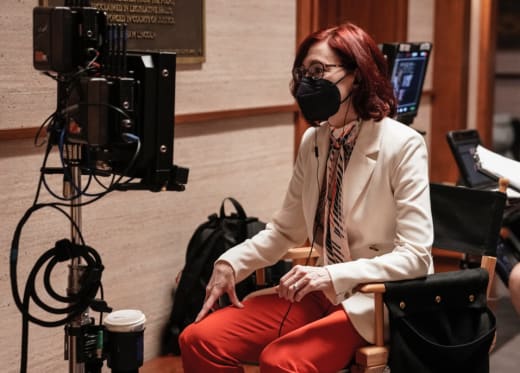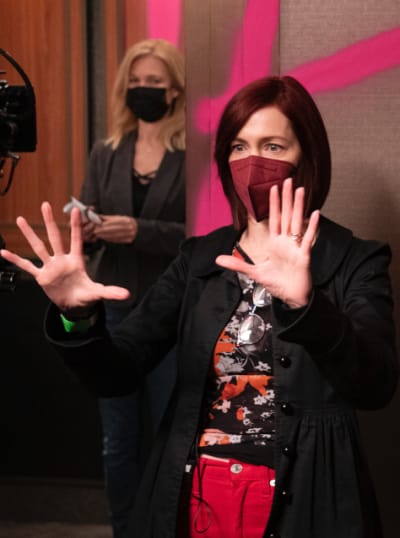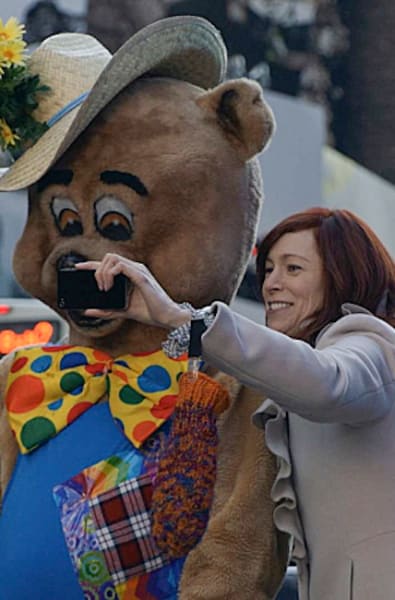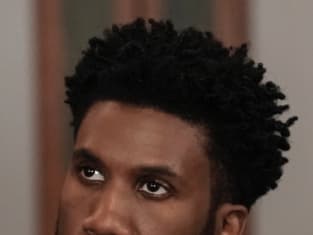Good Fight Director Carrie Preston Talks Homecoming, Difficult Storylines, and a Post-COVID Elsbeth Tascioni
 Jessica Lerner
at
.
Jessica Lerner
at
.
We had a chance to catch up with director Carrie Preston to chat about The Good Fight Season 5 Episode 7, which was a pivotal moment for the show.
Her alter ego, Elsbeth Tascioni, doesn't appear in the installment, but talking with her, we realized how badly we want to see Elsbeth in Wackner's courtroom. It would be epic.
Read on to find out what Carrie had to say about coming back to the franchise, her thoughts on the episode, and what's up with Elsbeth Tascioni.
What was it like coming back to The Good Fight? This time you were a director, but you've been part of this family for so long.
Yeah, it was kind of like being at home. It's been a while since I've been there as an actor, but I always feel welcome. Back when I was on The Good Wife, I had asked if I could shadow Brooke Kennedy, who's the executive producer of the show and one of their main directors. So I followed her around and started to learn the ropes.
Then I went on to direct on Claws, which is the show I’ve been on for the last four years. I directed two episodes there, and then The Good Fight gave me a shot. I came back and shadowed [Kennedy] on the episode right before mine. She's my mentor, so she walked me through the ropes.
It was great to be back on that set and be with that crew again -- albeit in a different capacity. I felt excited and nervous and all those things that one feels once trusted with something as big as an episode of a major project. But, it went really well.
The crew is great. It's just such a family over there because they've been working together for so long. A lot of them have been there since The Good Wife.
They gave you a lot to work with this episode, from police brutality to #MeToo and cancel culture.
What I love about [this series] is it doesn't shy away from difficult subject matters, and it doesn't apologize for it. So my task was to make sure that even if a person comes in thinking one thing, they might have a different thought about that subject matter at the end of that scene.
That's exciting writing, and it was exciting to play and direct the actors and create that tension with the camera and with the scene work.
Diane and Liz represent a family suing the Chicago Police Department after a white office fatally tased their Black daughter. How did you approach such a sensitive and topical issue?
I tried to approach it with care and make sure that everybody was comfortable with the material. We had to shoot some things that were potentially very upsetting for the actors or even the background players or in the neighborhood we were shooting. I wanted to make sure all the neighbors knew we were making a television show, that this wasn't a real thing.
I didn't want anything upsetting or dangerous to happen. So there was a little bit of a tightrope that we had to walk, but I think we did it respectfully. I would talk to the actors before we started working on the scene. I made sure that everyone in the room was very comfortable with what was being said and done.
And everybody's a total pro on the show, and everybody brought their A-game. You can see that in the final cut.
Compounding this storyline was that Liz and Diane were at odds for most of the episode.
Yes. Audra and Christine wanted to treat that relationship with the respect and care they've had for it all these years, but it was definitely central to the episode and the arc of their relationship. I think it's great that you, in some ways, don't know who to root for, and you end up rooting for both of them, which is great.
That speaks to the level of expertise in the writing and what Robert and Michelle [King] can do as showrunners in creating this delicate balance. That's what keeps the viewer engaged as well.
Then, by the end of the episode, you have everyone believing their lesbian lovers, which I thought was hysterical.
It's such a great way to break the tension that had been building between the two of them. We had a wonderful time shooting that scene with Denis O'Hare in the judge's between the three of them, and it was much needed on set as well.
We shot that on our last day of shooting, and everyone had been exhausted because all the episodes are a long shoot. It was a great way to release all that tension, not only with the characters but the actors and the crew as well.
The other half of the episode focused on Wackner’s makeshift courtroom, and in the back of my mind at the start of the season, I’m thinking, “If anyone created their own courtroom, it would be Elsbeth Tascioni.”
Yes, I think that Elsbeth would have to have a wall in that courtroom and the 9¾ Wacky court. I bet she would give Judge Wackner a run for his money, that's for sure. But yeah, it was great to be a part of that. I had studied what they need to do, read all the scripts up until my episode. At first, I hadn't seen any of that footage.
I didn't know what was going on, like who was this was this alternative judge. But once we got in there, it was a breath of fresh air in a way to be in this completely different court and to contrast that with the state court, which is much more rigid. Seeing those back-to-back points to how different things are in those two courts.
The cases being tried in Wackner’s court this episode aren’t something silly like the fanfiction debate. Instead, you dealt with instances of cancel culture.
Yeah, the episode and the show are not afraid to tackle difficult subjects and to offer a point of view. So much now, I think people are scared to say what they think or take a stand.
This show will present one argument and then turn around and present the counterargument, leaving the audience unsure of who to root for, even if they have their own opinion about it. That is clever writing and might be a way we can start to talk about things happening in our world.
This episode was also a turning point for Wackner’s court. Until now, Wackner’s been very idealistic about what he wants his court to do, but he crosses this line at the end when he imprisons someone.
By design, this is where [the writers] want the audience to go, “Oh, huh, maybe, this is leading to some fascism. Like, we're not sure what this guy is going to do” and what happens when people take the law into their own hands. It can sometimes -- even if they don't intend it -- get out of hand.
So it's an important moment to see that what Wackner is doing is not all benevolent, that there are potential consequences. And whether or not you think those are good or bad, or you have some moral judgment on them, is the point.
We talked it through with Robert and Michelle King and making sure, in particular, the #MeToo case was telling both sides of the story. I feel like we accomplished that. And it's hopefully going to open up conversations for people who are watching it from home as well.
You couldn't have two more polarizing cases if you tried. There’s very heavy subject matter, but you also get more light-hearted moments during the court’s antics.
There are, and those work because you have the levity, and that speaks to the writing. If you come in too heavy-handed, then it becomes dogmatic or preachy, and you lose, you lose the argument, and you lose your audience. So I think in this way, it becomes more complicated, more nuanced, and, quite frankly, more interesting to watch.
So I wanted to make sure that I was keeping that tension in balance as much as possible as the director. I approach my acting in the same way. I like to find humor in the drama and drama in the humor.
I felt like it was a good episode for me as a director because those are my goals as an actor, and I was able to transfer those to my directing as well.
Would you ever consider coming back as Elsbeth?
I would play Elsbeth every day of my life if you invited me to. I wish it were up to me, but whatever it is that they ask, I will be there in a heartbeat.
Where do you think your character is during all of this?
Oh, I think she's just kicking ass and taking names as always. I don't know where she is. I always trust the writers to bring that to me, but I think she would do very well in Judge Wackner's court.
She would probably feel very comfortable there and would probably give him a little bit of a run for his money. I don't think he would know what to make of her.
Now I want to see Judge Wackner and Elsbeth go head-to-head. That would be so much fun to watch.
Yes, me too. Well, maybe down the line. We'll see. I don't know. I'm just happy that I still get to be a part of the family no matter what. So, director, actor, I'll take it, I'll take it all.
What do you want people to take away from this episode?
I want people to feel challenged and engaged and maybe a little bit conflicted. I hope that they'll maybe be looking at some of these subject matters just in a different light. I'm not saying I'm trying to change anybody's minds. I'm just saying it might illuminate things.
------------------------------------------
New episodes of The Good Fight drop Thursdays on Paramount+.
Jessica Lerner was a staff writer for TV Fanatic. She retired in October 2021.


















